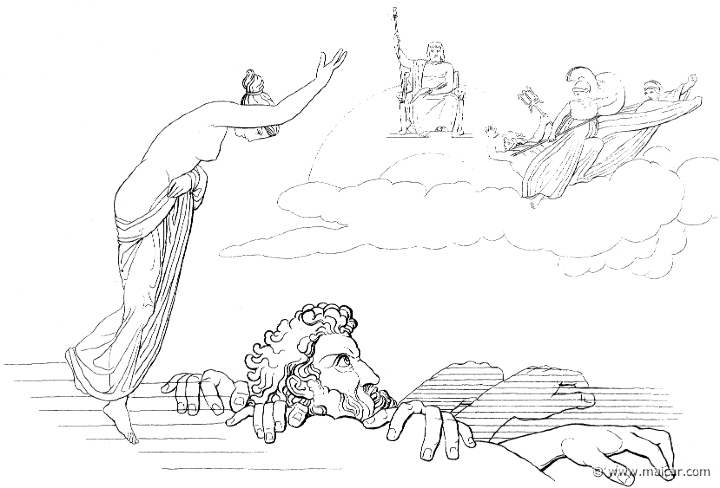|

|
The nereid Thetis and Briareus, of the hundred hands. | il035flax: "But you came, goddess, and freed him from his bonds, when you had quickly called to high Olympus him of the hundred hands, whom the gods call Briereus ..." (Hom.Il.1.400). John Flaxman (1755 – 1826).
|
|
|
".. of all the children that were born of Gaia and
Uranus, these were the most terrible, and
they were hated by their own father from the
first." (Hesiod, Theogony 155).
|
|
The HECATONCHEIRES (hundred-handed) are
Briareus, Cottus and Gyes, the most terrible
offspring of Uranus.
Uranus did not like
his children
The three HECATONCHEIRES were enormous both in size and might, and each of them had one hundred hands and fifty heads. But for being either so good or so bad, their
father Uranus detested
them. Consequently, he hid them in a secret place
of earth, or cast them into Tartarus, a gloomy
place in Hades where
no one wishes to sojourn in, along with his other
sons the CYCLOPES, whom
he also hated. And having them all well hidden, he
rejoiced in his evil doing. This is what the ruler of the universe,
apparently ignoring that injustice nourishes
sedition, did against the HECATONCHEIRES and the CYCLOPES, his own
offspring. But his wife Gaia, not wishing her
children to suffer the perpetual prisoner's fate,
or to be straitened for having their children
within, persuaded the TITANS to revolt against
their father. And they, led by Cronos, attacked and
dethroned Uranus, after having castrated him (see also Castration of
Uranus).
New rule same as old
Now Cronos, having
coveted his father's chair more than he was
disgusted at his deeds, hurled the HECATONCHEIRES
down to Tartarus again, as soon as he had gained
power. For he, some suggest, was jealous of their
manhood and comeliness. In Tartarus, where Night spreads about in
triple line, they were guarded by Campe, a gigantic
jaileress with clusters of poisonous serpents for
hair, who was covered with sea-monster's scales
from the chest to the parting-point of the thighs.
The HECATONCHEIRES save the gods
Cronos cannot be said
to have been more fortunate than his predecessor;
for also he was the victim of a conspiracy, being
fought against for ten years by Zeus and the gods, his own
children. Gaia then
prophesied victory to Zeus if he should have as allies the CYCLOPES and the
HECATONCHEIRES. So Zeus,
having slain their jaileress Campe, freed them, and
provided the HECATONCHEIRES with nectar and
ambrosia, so that their spirit should come to life
again. The gods then, armed with the weapons that
the CYCLOPES had given
them, and helped by the many missiles of the
HECATONCHEIRES, overcame the TITANS (see also Titanomachy). The HECATONCHEIRES' capacity for bombardment was
proverbially remembered in later times; for it is
said:
".. if a man were gifted by nature with the frame of .. a Briareus, with his hundred hands he ought to be able to throw a hundred darts." (Plato, Laws 795c).
And those who tell the story say that the
HECATONCHEIRES made the battle particularly harsh.
For they, being insatiable war lovers, hurled three
hundred rocks in quick succession, overshadowing
the TITANS, and defeating
them. And when the TITANS were brought to prison in Tartarus, Zeus appointed the
HECATONCHEIRES to guard them, and Poseidon gave Briareus
his daughter Cymopolea as wife.
Where they dwell
Later the TITANS were
released by Zeus, and the
Hecatoncheires Cottus and Gyes went to dwell at the
source of the Ocean. It is not clear where Briareus
and his wife live, but he was seen by Aeneas when he descended
to Hades, beside the
Elm of False Dreams.
Interventions of Briareus
On one occasion, Briareus arbitrated in the
dispute between Helius and Poseidon,
concerning the lands about Corinth: he assigned to Poseidon the Isthmus of Corinth and the adjacent lands, and gave to Helius the height above the city (Acrocorinthus). Briareus is also remembered for having averted a
minor conspiracy in heaven. For it is told that
when Hera, Poseidon, and Athena plotted against Zeus, planning to throw him
into chains, he was saved by Briareus. The
Hecatoncheire, whom Achilles' mother Thetis
had called, came to Zeus'
rescue, and by squatting down close to him,
frightened the other gods away through the mere
display of his force.
|